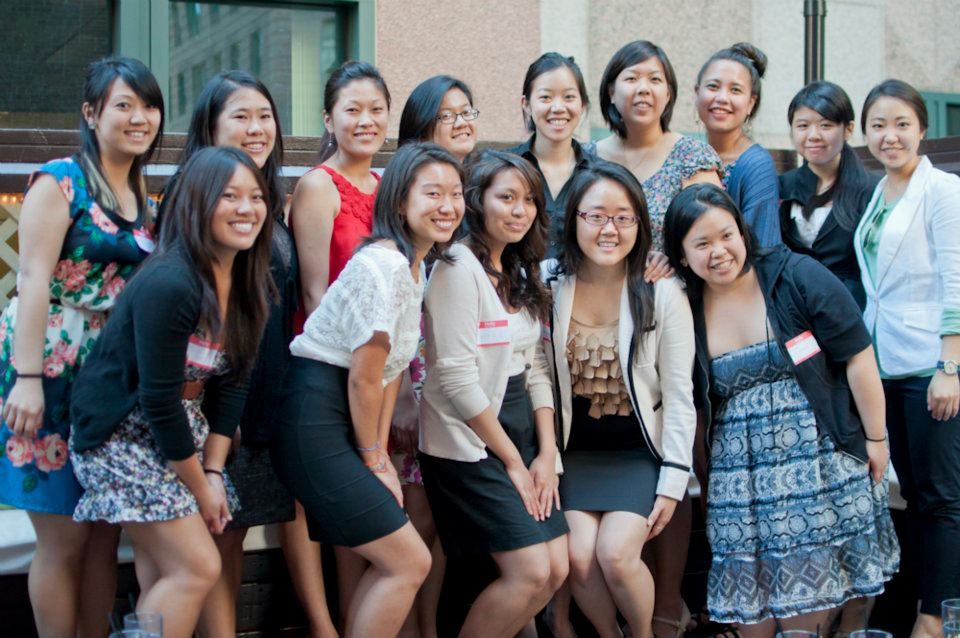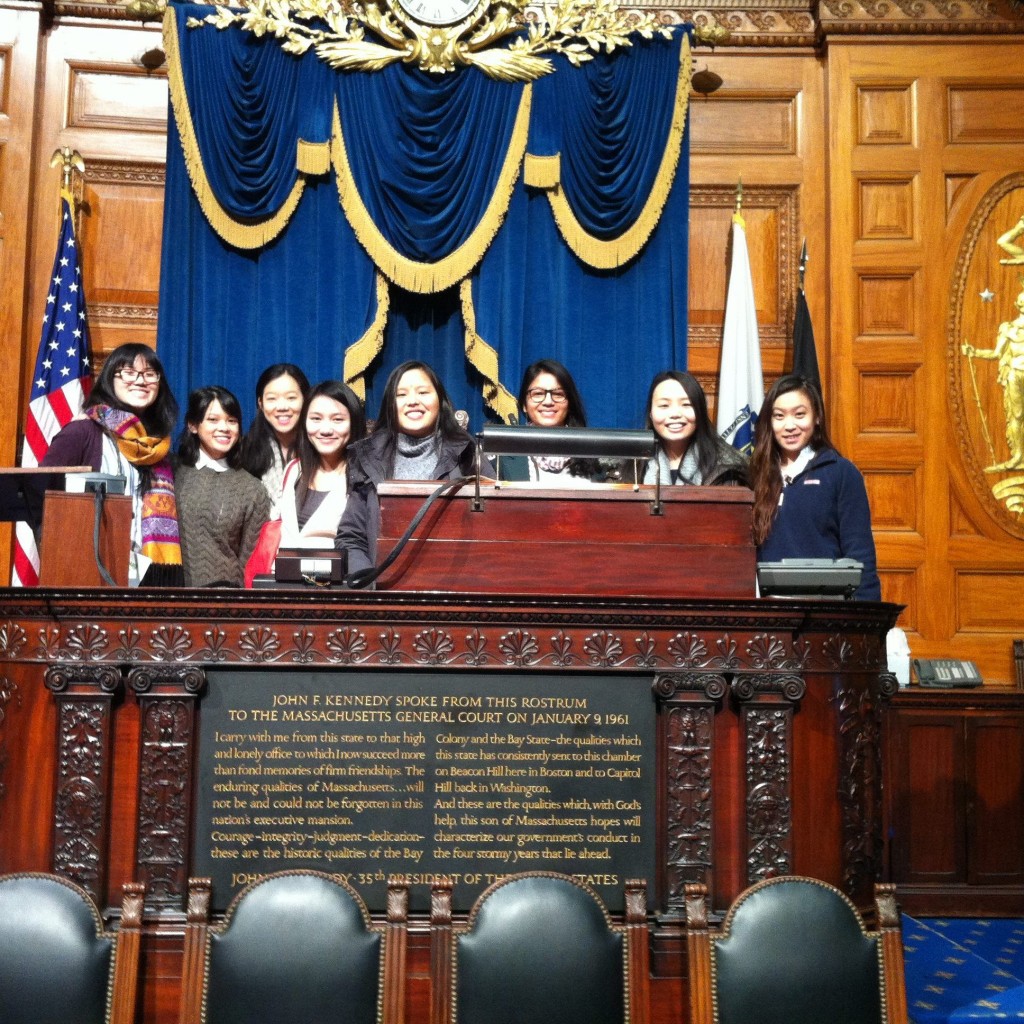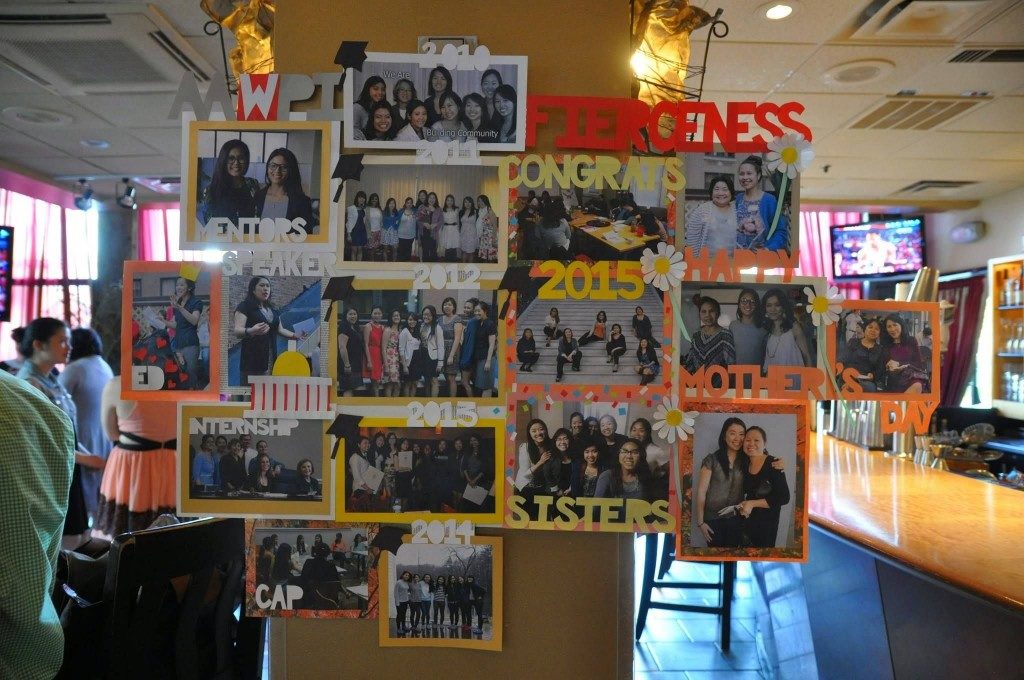A Conversation with Diana Hwang

2012 AAWPI Graduation with Mayor Lisa Wong
Diana Hwang founded the Asian American Women’s Political Initiative (AAWPI) after she noticed that Asian-American women were noticeably absent in Massachusetts politics both behind the scenes and on center stage. The State House Fellowship Program, a key program of AAWPI, matches Asian-American women with state legislators to provide first-hand political experience. Political Parity’s Research Director, Malliga Och caught up with Diana to have a candid conversation about the unique barriers to political and civic engagement Asian-American women face and how to overcome these obstacles.
Why do you think more Asian-American women aren’t running for political office?
There are barriers that all women face. For example, women typically have to be asked to run for office [compared with men, who frequently self-recruit] and that applies to Asian-American women, as well. At every benchmark of political engagement and power –from registering to vote all the way to visibility in government – the Asian-American community falls behind. I think part of that is, as a heavily immigrant population, many Asian-Americans come from countries where you can be persecuted for being politically outspoken, and that prevents full participation here in America. For me, my parents are immigrants and growing up, we never talked about politics at the kitchen table. Politics wasn’t something that my parents encouraged me to do. Their families were poor and they came to this country for a better life. I think a lot of our immigrant Asian-American parents push us towards careers and a life that is more stable and politics is not stable. Politics is seen as dirty, it’s rough and tumble, and there’s no clear path…it’s not encouraged. Those are things my organization is working to attack, but we’re still behind.
We’re still very much operating on a “first” and “only” basis when it comes to Asian-American women elected officials.
Once Asian-American women make the decision to run for political office, what unique barriers do you think they face?
[All] women of color face similar issues. For Asian-American women, in particular though, we’re perceived to be foreigners. Asian-American women run and they’re depicted as carpetbaggers, and there’s an implied attack wrapped up there that we’re not fully American. One perception of Asian-Americans is that they’re well-off and stable, and so there’s an impression that jumping into a campaign is easy, financially, for Asian-American women. In reality, in Boston, 46% of Asian-Americans are low-income and running for office and being able to afford it is as real a barrier to entry for Asian-American women as it is for all women of color. I think that once an Asian-American woman is a candidate, common societal stereotypes of Asian-American women as exotic or docile or as “dragon ladies” play out in different ways on the campaign trail…

There is often a misperception that all Asian culture is similar, but Asian-American women do not have a single common language or cultural affinity with one another. Is it possible to create a common sense of identity with voters?
It’s absolutely possible but it requires work. To some degree, even the category of Asian-American is made up; it’s a census term. That’s part of the reason why you see the disconnect. We’re considered monolithic, but the Asian-American community is incredibly diverse. We have to build an Asian-American women’s movement and we build that around real issues that affect all of us as Asian-American women. Close to half of all of Asian-American women experience some form of physical or sexual violence in their lifetime. When we’re talking about domestic violence, there are cultural issues, immigration-related issues that need to be dealt with. In terms of mental health, young Asian-American women ages 15-24 have one of the highest rates of suicide of any race/ethnicity.
In part, I started this organization to give a space for Asian-American women to be whole – to be both Asian-American and a woman, [and] not have to separate those identities. I felt like Asian-American organizations didn’t want to talk about things that were important to me as a woman, like reproductive health. I felt like women’s organizations didn’t want to talk about things that mattered to me as an Asian-American, like culturally competent healthcare and bilingual ballots.
Why do you think we have seen a rise in Asian-American women running for office in past years?
Yes, there’s been a rise in Asian-American women running for office, but we still haven’t come as far as we’d like. Less than 0.5% of state legislative seats across the country are held by Asian-American women [17.3 million people, or 5.7%, in the US currently identify as Asian American]. It’s hard to imagine that you belong in government or can and should run for office if you don’t see faces that look like yours. We’re still very much operating on a “first” and “only” basis when it comes to Asian-American women elected officials. Seeing trailblazers like US Senator Mazie Hirono and Congresswoman Grace Meng on the federal level or Mayor Lisa Wong and Boston City Councilor Michelle Wu in Massachusetts politics is very important. But, I think part of the rise in Asian-American women running is that more [Asian-Americans] are realizing that government affects our communities and that running is a real way to make change.
Asian-Americans are often stereotyped as the “model minority”. Do you think this attitude is part of the reason why the political disenfranchisement of Asian-American women has been overlooked?
Yes, or the common perception that there are no real issues in the Asian-American community, that we’re all okay. There is the perception of Asian-Americans as being well educated, being well-off, being relatively successful. There are a lot of statistics that [indicate] that there is real need in our diverse communities. Cambodian-Americans in Lowell, and Vietnamese and Chinese Americans in Boston have some of the lowest high school graduation rates in the state. If there’s no perception of disparity to begin with, then there’s a belief that there’s no work to be done, and attention and focus can be directed to other communities. And, so our Asian-American community organizations doing crucial work around these issues get overlooked for state or local funding because of this dominant narrative that Asian-Americans are doing great.
I started this organization to give a space for Asian-American women to be whole – to be both Asian-American and a woman
Do you think that translates into the political arena?
Absolutely, and I think some of this is internalized, as well. Obviously, there are other factors as to why Asian-Americans haven’t been politically engaged, but if you don’t understand why and how government affects your life, or understand the impact it has, then you don’t think you need it at any level, from voting to running for office.
I think the political disenfranchisement works on both ends. I think the decades of voter registration and mobilization work done by grassroots community organizations has finally gotten the political establishment to take notice of the Asian-American community as a potential force, but not until recently. Otherwise, if the prevailing perception of Asian-Americans is that they’re rich and smart like the model minority stereotype has us believe, then it’s not a very urgent or compelling problem that Asian-American women aren’t running for office and lack political power.
What would you tell an Asian-American woman who is considering running for office?
Do it. You’re going to have to work your butt off, door knock until you’re falling over, and it’s not going to be easy, but know that you running, in and of itself, is inspiring to so many people, including me.

